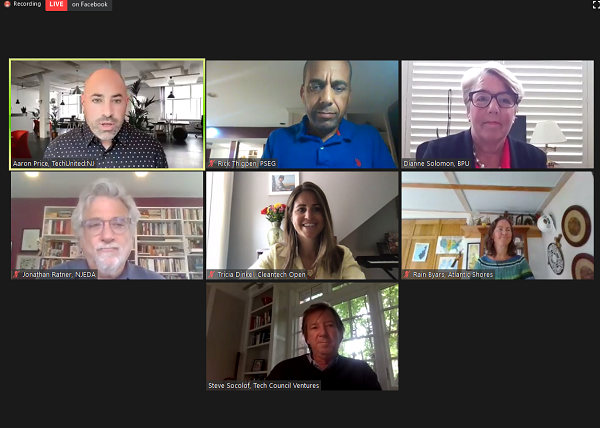New Jersey Green Ecosystem Topic of CleanTech Impact Challenge Semifinals
On September 24, TechUnited:NJ and PSEG held the semifinal event for the CleanTech Impact Challenge.
Three startups emerged from this event — Accelerate Wind (St. Louis), Power Edison (Watchung) and WexEnergy (Rochester, NY) — as the finalists who will vie for the $50,000 prize. They will pitch at Propelify on October 7 at 1 p.m., and the winner will be announced immediately afterwards.
Before the semifinal pitches, Aaron Price, TechUnited:NJ CEO, hosted a discussion with all of the judges at the Challenge. Many panelists were from New Jersey, but there were others from out of state who had clean-tech expertise and perspectives. Ralph Izzo, PSEG chair and CEO, also presented some preliminary remarks. The video of the event can be found here.
Izzo noted that PSEG’s goal in the CleanTech Challenge was to discover entrepreneurs who are reinventing the clean energy industry, so they could be matched with companies like his. But there’s more.
“We are looking for new innovations from promising startups, especially those who focus their skills and imaginations on equity workforce transformation, to help with economic and industry disparity.” The Challenge presented the contestants with opportunities for coaching, collaboration, press coverage and, more importantly, for getting “their product into the market with our customers,” Izzo said.
Some 59 teams applied, and TechUnited:NJ and PSEG narrowed the field to 10 semifinalists.
Pandemic Makes Energy Reliability Critical
The Challenge was initiated at a time when the pandemic had changed the way we work, go to school, shop and even interact with each other. It has “focused more of our attention on our homes, which are now central to of lives, our careers and well-being more than ever before. Where energy was an essential service before,” now reliability is “absolutely critical,” Izzo said.
He added that, “at PSEG, our goal is to help New Jersey become a global climate change leader.” And he spoke about the recent approval by the New Jersey Board of Public Utilities (BPU) of PSEG’s program for energy efficiency, under which the company will invest $1 billion over the next three years.
“What this allows the utility to do is, rather than make their money based upon volumetric sales and energy usage, they can now promote energy efficiency with less use of their product, and still make a return.” Rick Thigpen, PSEG
During the discussion, Rick Thigpen, senior vice president for corporate citizenship at PSEG, noted that the BPU’s decision has made a significant change in the way utilities are allowed to participate in the push toward energy efficiency. “What this allows the utility to do is, rather than make their money based upon volumetric sales and energy usage, they can now promote energy efficiency with less use of their product, and still make a return,” he said.
Thigpen emphasized that the winners needed to address not only energy efficiency or some other energy problem, but also the issue of equity. “Equity is designed to be one of those things to help us unlock the fabulous potential of an increasingly diverse workforce and population, and hopefully make us all happier and more prosperous together in the future.”
New Clean Tech NJEDA Programs Coming
Speaking for the New Jersey Economic Development Authority (NJEDA), Jonathan Ratner, clean energy/green finance officer, discussed the State’s clean-tech focus, notably the new programs launched with BPU support.
Next quarter, the NJEDA expects to launch a pilot program that will provide seed capital for early-stage companies. Also, the NJEDA will be working with the PEW research think tank to create an asset map for clean energy. “We are going to identify underused assets in the State of New Jersey that are available to support clean-tech R&D” and will promote the sharing of these resources, whether they be in a university, nonprofit, or even a corporate setting. “And the last part of that, we are going to offer vouchers to early-stage companies to help them use those shared facilities,” Ratner said.
BPU Commissioner Dianne Solomon responded to a question from Aaron Price about how reducing energy consumption in low-income households will affect everyone. “Reaching low-income households has traditionally been more expensive than in most communities because they are a harder-to-reach community.” Members of this community also use more energy because they haven’t retrofitted their homes or have had the opportunity to participate in energy-efficiency programs, such as those that reduce energy use during the times of peak demand. By reducing their energy use, especially during the peaks, lower-income households could save energy and costs for everyone in the state. The BPU is working to develop programs to reach these households, she said.
Price noted that Steve Socolof, managing partner at Tech Council Ventures (Summit), had educated him on some aspects of investing in clean tech. “To the extent that they [startups] are hardware focused, there is often a lot of capital and a lot of risk involved in reaching commercialization,” he said.
What should a clean technology look like when it’s brought to a potential investor? Tricia Dinkel, northeast program manager at Cleantech Open (Los Angeles), said that she’s seen a huge push for storage and for startups in the agricultural space. “There’s a lot of intuition” involved in choosing which tech or startup founder to support, she said. The technology itself “needs to have roots, it needs to have credibility.” Entrepreneurs need to explain how they approach the technology because it’s still at an early stage, when it can be piloted and often changed or developed further. The startups also have to be amenable to feedback and listen to it. Then they have to know whose opinions to follow, how to assess those opinions, and how to integrate the feedback into their development processes, she said.




